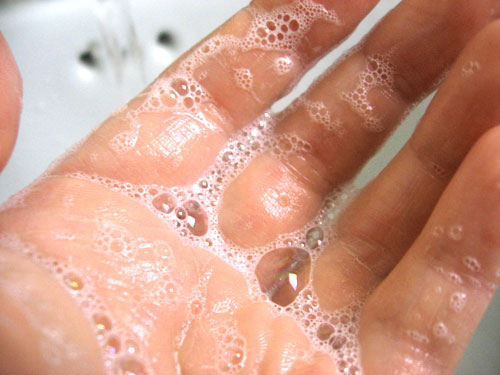JUST LIVING Blog–
Ah…there’s nothing quite as lovely as a nice warm shower or bath. Soap, shampoo, and clean water at a pleasing temperature are truly a gift. They are also a luxury for most of the world’s population. The large hot water tank in our house makes multiple showers possible without anyone experiencing the discomfort of running out of warm water. We’ve never run out of soap, and a visit to any local store yields an abundance of choice in the realm of shampoo, conditioner, and shower gel. In fact, I just counted 15 bottles of assorted shampoo and conditioner. Good grief!
My spouse and I are pretty sparing in our use of such products. He has only one bottle. I have two bottles of shampoo and two of conditioner (good quality, organic). A stash like that lasts me about six months. The rest of the motley assortment belongs to the three teens in the house. Oh, I forgot to mention the bottle of dog shampoo. Plus, there’s hand soap in both bathrooms and the kitchen, and dish soap and laundry detergent. We should have NO trouble keeping squeaky clean.
Soap and water are pretty basic items in most North American households. We expect to have access to them, and are startled when we do not. This summer, for example, we rented a vacation cottage on Buzzard’s Bay that featured the tiniest hot water heater I have ever seen. One person could take a quick shower and not face a freezing rinse, but it had to be a speedy one. I ended up taking the old “military-style” shower where you turn on water long enough to get wet, turn it off, lather up, and then turn it on to rinse. Still, we had soap, water, and a shower.
 Soap and plentiful, much less clean, water are luxuries for most of the world. I was reminded of that fact last week in an e-mail update from ELCA missionaries Joe and Deborah Troester, who live and work in the Central African Republic. Their message noted that October 15 was Global Hand-Washing Day. Hand-washing is a critical practice to reduce the spread of diarrheal illnesses.
Soap and plentiful, much less clean, water are luxuries for most of the world. I was reminded of that fact last week in an e-mail update from ELCA missionaries Joe and Deborah Troester, who live and work in the Central African Republic. Their message noted that October 15 was Global Hand-Washing Day. Hand-washing is a critical practice to reduce the spread of diarrheal illnesses.
Joe writes, “PASE, the Water Management Project of the Evangelical Lutheran Church of the Central African Republic (CAR), is working to provide clean drinking water to villages in the CAR and also to teach good hygiene practices to villagers, such as the importance of hand-washing.…This year PASE will be constructing latrines and hand-washing stations at schools and health centers in CAR in order help the “hand-washing habit” to take root.”
The congregation I serve, Trinity Evangelical Lutheran Church, just finished a project to collect soap for Lutheran World Relief. This small congregation gathered 160 bars of soap weighing about 35 pounds. The chairperson of our evangelism committee reminded us that a cake of soap is a prized item in other parts of the world, being dried carefully between uses in order to preserve it as long as possible. Antibacterial soap is especially valued and needed to prevent the spread of bacteria.
Although some folks remember the days of washtubs, water heated on the wood stove, and shared bath water, most of us take for granted simply turning a faucet and lathering up. Yes, soap and water seem minor in the scope of our North American abundance, but that is certainly not the reality for most of the world’s population. Rub-a-Dub-Dub…let’s share some soap in love AND consider carefully the water and soap we are blessed to use so freely.
- How can we be better stewards of our abundance?
- When was the last time you took a “military-style” shower or shared a tub of bath water with someone else?
- What is the longest time you have gone between a bath or shower? How did it feel to finally wash the dirt and grime away?
- What can you do to see that others have soap and water for drinking and bathing?
(Photos by the Italian voice and Julien Harneis used under Creative Commons License. Thanks!)
NOTE: The “For Granted” series examines an array of resources and everyday advantages that are all too often overlooked, undervalued, or assumed. Thanksgiving is coming, and not only do I want to count my blessings and give thanks for them, I also want to explore the ripple effect of what these “blessings” really cost. Who suffers or is exploited so that I am able to enjoy a particular item? Am I taking more than my fair share of a resource? What impact do my choices have on the rest of God’s children in this world? When I take even a glass of water from the tap for granted, how well do I show love for my neighbor?




Leave a Reply